Review: Doctor Who, “Space Babies” & “The Devil's Chord” | Season 14, Episodes 1 & 2
Doctor Who is back with an uneven—and unexpectedly joyful—set of premiere episodes
Welcome to Episodic Medium’s coverage of the 14th season1 of Doctor Who—which debuts Fridays on Disney+ globally and Saturdays on BBC in the UK. As always, this first review is free for all, but subsequent reviews will be exclusively for paid subscribers. For more information on what shows we’re covering and what your subscription supports, check out our About Page or become a free subscriber for future updates.
When it comes to Doctor Who, there are two types of lead performers: Those who take a minute to settle into the role (David Tennant, Peter Capaldi) and those who immediately lock into their portrayals from the word “go.” And with 3.5 episodes under his belt, it’s clear that Ncuti Gatwa belongs alongside Christopher Eccleston and Matt Smith as actors who just are the Doctor from the moment they first appear on screen.
Gatwa’s got the empathetic, self-important curiosity that’s key to making the Doctor feel like the same character we’ve known and loved for 15+ regenerations. But he’s also got a playfulness that makes the Fifteenth Doctor totally unique as well. He’s a believable post-therapy version of the Doctor—one who’s less weighed down by his past, even when revisiting old traumas like the loss of Gallifrey. But that doesn’t mean he’s not still impulsive and irresponsible and just a touch manic too.
It's crucial that Gatwa works as well as he does because his first proper season as the Doctor gets off to a rather uneven start in its first two hours. While I was initially worried that Disney+ was dropping two episodes at once in order to burn through this eight-episode season, it now seems clear they were just trying to give this new era its best chance to shine. Because while the Beatles-infused historical outing “The Devil’s Chord” is (mostly) a rollicking good time, the season premiere, “Space Babies,” is a pretty baffling way to lure new viewers into this global era of Doctor Who. You need an actor as charming as Gatwa to make the repetition of “space babies” feel like an actual joke and not, well, a leftover bit of hacky 1980s comedy.
For their first big adventure in the TARDIS, the Doctor and Ruby land on a space station in the year 21,506 where they find a baby farm run by talking babies (space babies!) and a gooey monster straight out of a nightmare. That means “Space Babies” is basically Look Who’s Talking meets Aliens, with a dash of random political commentary about refugees and right-wing reproductive hypocrisy. (Although that’s only after an opening act that tries to cram every single bit of Doctor Who exposition into a clunky 12 minutes.)
With its wacky infants and sci-fi Rube Goldberg Machines, “Space Babies” leans into a flavor of over-the-top comedy that’s not totally unfamiliar to Doctor Who (especially under the initial tenure of showrunner Russell T. Davies). But while it might have worked okay as a silly filler episode tucked into the back half of a longer season (I’m looking at you “Sleep No More”), I really question the choice to use it as a high-profile launch to an entire new era of Doctor Who. Especially on the heels of a Christmas special that was already pushing the bounds of silliness with its big Goblin song and dance number.
Yes, kid-friendly silliness is definitely a part of Doctor Who’s DNA. But it’s not the only part of the show’s DNA. And save for a few really nice moments (the Doctor’s monologue about everyone being unique; the gorgeous imagery of snow seeping out of Ruby’s memories), “Space Babies” doesn’t get the balance quite right. That it’s half-baked on a plot level is par for the course for a Davies episode. That it doesn’t really work on an emotional level either is far more egregious. (I really struggled to track the arc for Golda Rosheuvel’s nanny Jocelyn.) “Space Babies” is watchable enough thanks to its likeable cast, and certainly primes the thematic pump for a season about two foundlings looking to understand where they came from. But surely there could’ve been a more elegant way to introduce those themes to an audience who may still be skeptical about Who.
Thankfully, elegance is something “The Devil’s Chord” has in spades—starting from the moment guest star Jinkx Monsoon slithers out of a piano in full Disney villain drag and continuing into the absolutely fabulous Swinging London looks that the Doctor and Ruby don for a trip to Abbey Road in 1963. If “Space Babies” feels like a lesser riff on the time the Ninth Doctor took Rose Tyler to a space station back in “The End of the World,” “The Devil’s Chord” feels like a stronger redux of the Rose/Ten 1950s adventure, “The Idiot’s Lantern.”
At Ruby’s request, she and the Doctor decide to pop by Abbey Road to watch The Beatles record their first ever album. Only something has gone wrong with music and instead of “Love Me Do,” they’re laying down jingles about dogs and dreaming of going back to Liverpool to get steady jobs. It’s an unsettling alternate timeline that Davies suggests will eventually lead humanity to destroy itself (“Without music, the human race goes sour”). And it allows this era of Doctor Who to continue its focus on whimsical fantasy over hard sci-fi.
Indeed, it turns out Jinx Monsoon’s music-eating Maestro is literally a child of Neil Patrick Harris’ Toymaker from “The Giggle.” And “The Devil’s Chord” suggests there may be a whole family of campy celestials waiting to do battle with the Doctor. As with the comedy of “Space Babies,” it’s a flavor of Doctor Who that might not work for everyone. But I don’t mind this more Neil Gaiman-esque take on the Whoniverse. Especially when it seems like Davies is using the premise to invite his favorite performers to ham it up in increasingly over-the-top ways.
If I have a quibble with “The Devil’s Chord,” it’s that Jinx Monsoon is so immediately impactful a presence that I ultimately could’ve used a little less time with Maestro and a little more with The Beatles themselves, who are a bit of an afterthought even though John and Paul ultimately save the day by coming together to create the perfect musical chord. And a stronger draft of this script might’ve leaned even further into Ruby’s own musical talents and her ability to connect with the Beatles as a fellow musician too.
Speaking of Ruby: It’s interesting to compare this iteration of Doctor Who with Davies’ first run of the show back in 2005. Back then, it felt like he related most to Rose Tyler and the dream of being an everyday person swept up by the Doctor. This time, however, he’s written a Doctor who functions far more as his avatar. And while that’s a boon for Gatwa, it leaves Ruby stuck a bit more in “generic companion” mode, held together mostly by Millie Gibson’s winning performance and some very Steven Moffat-esque mysteries about hidden internal songs and mysterious all-powerful forces tied up in her birth.
Still, it’s early days for this new era of Doctor Who. And if “Space Babies” gets things off to a comedically rocky start, “The Devil’s Chord” course corrects with a more confident energy—right down to a big, splashy musical finale that seems like it took up the majority of the episode’s budget. While the 60th anniversary specials were Davies’ chance to pick up where he left off in his original run, these first two episodes (along with the “Church on Ruby Road” Christmas special) suggest Davies intends to bring a different energy to Gatwa’s era of the show.
In fact, Davies has explained that one of the reasons he wanted to return to Doctor Who is to feel more connected to his late husband, who passed away in 2018. And I think that’s actually a big part of the reason for the lighter, more colorful, more joyful tone this season is embracing. Back in 2005, Davies wrote a Doctor defined by a grief he could never quite escape. Here, however, he’s written a Doctor with a different perspective on loss. “I am the last of the Time Lords,” the Doctor tells Ruby. “And I am so, so glad to be alive.”
This time around, Davies is de-emphasizing trauma and refocusing on joy. And while it remains to be seen how well that will work for a season-long run of episodes, there’s no doubt it’s a great fit for his joyful new leading man.
Stray observations
Welcome back to a brand new season of Doctor Who! I had an absolute blast covering last year’s 60th anniversary specials and the 2023 Christmas special, and I can’t wait to hang out in the TARDIS with you all again for the next six weeks. I just got back from a trip to London where I walked by Abbey Road Studios and saw an IRL TARDIS-style police box, so these episodes couldn’t have come at a better time.
Calling Gallifrey “kind of posh” really made me laugh.
The Doctor sure gives Ruby that TARDIS key quickly, huh? Also, I’m a little confused how long she’s been traveling with him. “Space Babies” ends with the TARDIS landing in Carla’s flat on Christmas Day, but “The Devil’s Chord” mentions that it’s June or July in Ruby’s time.
The shot of the Doctor looking at Ruby’s DNA scan on the TARDIS console felt like it came right out of the Amy Pond pregnancy arc from season six.
“The Devil’s Chord” slows things down to have the Doctor discuss his granddaughter Susan (companion to the First Doctor), which certainly seems to suggest she’ll be popping up in some form this season, right?
I loved the little meta touch of Maestro playing the Doctor Who theme song on the piano over the credits sequence in “The Devil’s Chord.” Ditto the Doctor saying, “I thought that was non-diegetic.”
The Doctor’s pinstriped suit is an immediate scene stealer, but I also love his little tight cropped sweater in “Space Babies.”
“Goblin Song” > “There’s Always a Twist at the End”
“I completely forgot the butterfly compensation switch.”
I absolutely wouldn’t have caught this if a press release didn’t ask me to avoid spoiling it before the episodes debuted, but the woman (played by Susan Twist) who serves the Doctor and Ruby overpriced tea at Abbey Road in “The Devil’s Chord” also pops up as a comms officer in “Space Babies” and previously appeared alongside Isaac Newtown in “Wild Blue Yonder” and as a concert-goer in “The Church on Ruby Road.” Feel free to file your guesses for what that’s all about! I’m already starting to lose track of how many ominous teases we’ve gotten so far…
Next week: An episode written by Steven Moffat (!!!!)
Okay, Myles here, as this is complicated. Technically, Disney is labeling this as Season 1 in global territories, and they’ve also listed this as episodes 2 & 3 (with “The Church on Ruby Road” as episode 1). But the BBC is not doing this, we don’t think, and is calling these episodes one and two. We’re sticking with the BBC logic for the time being, but if you’re a new U.S. viewer confused, you’ll learn quickly to just roll with the chaos of understanding the show and its history.




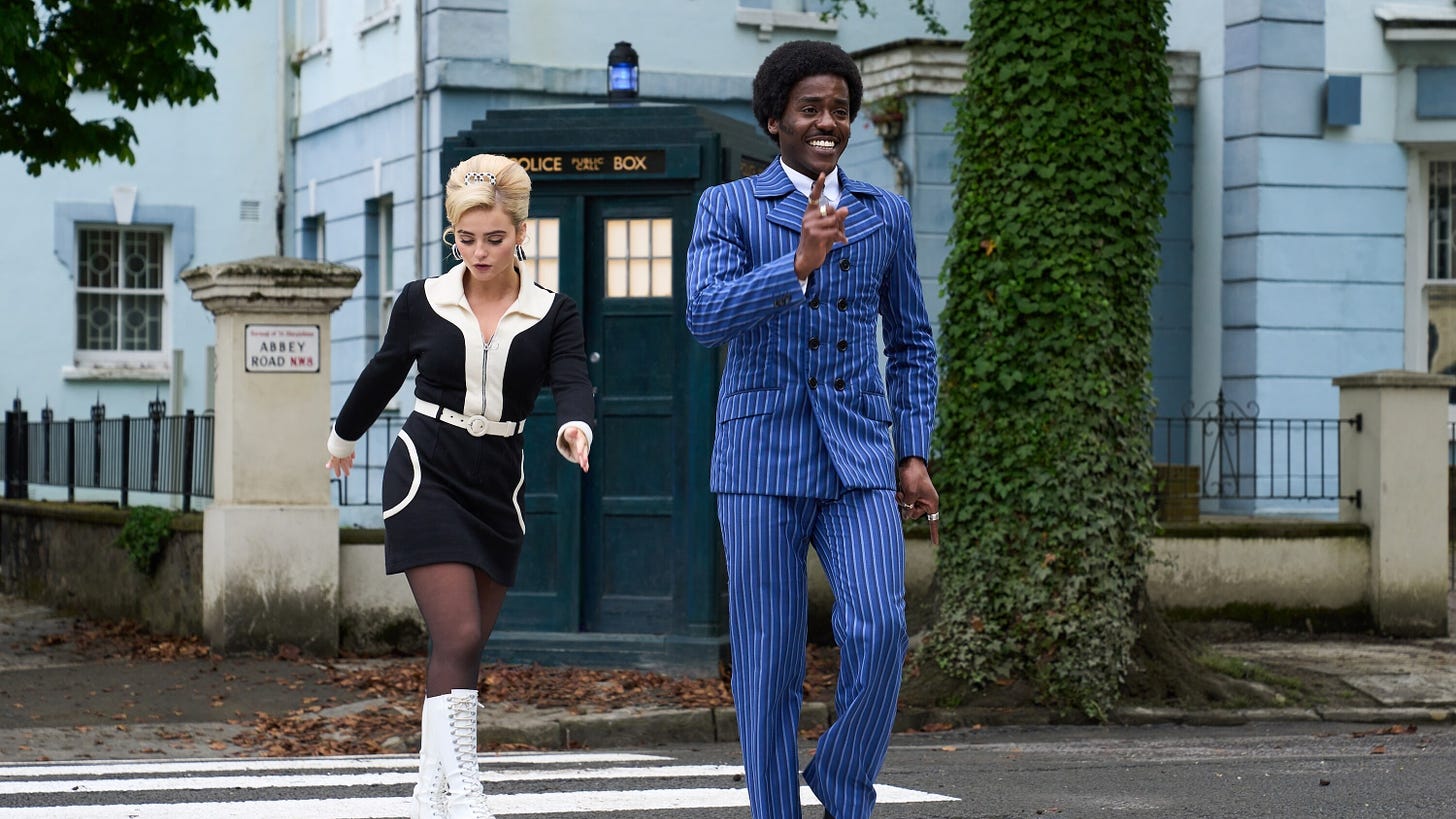
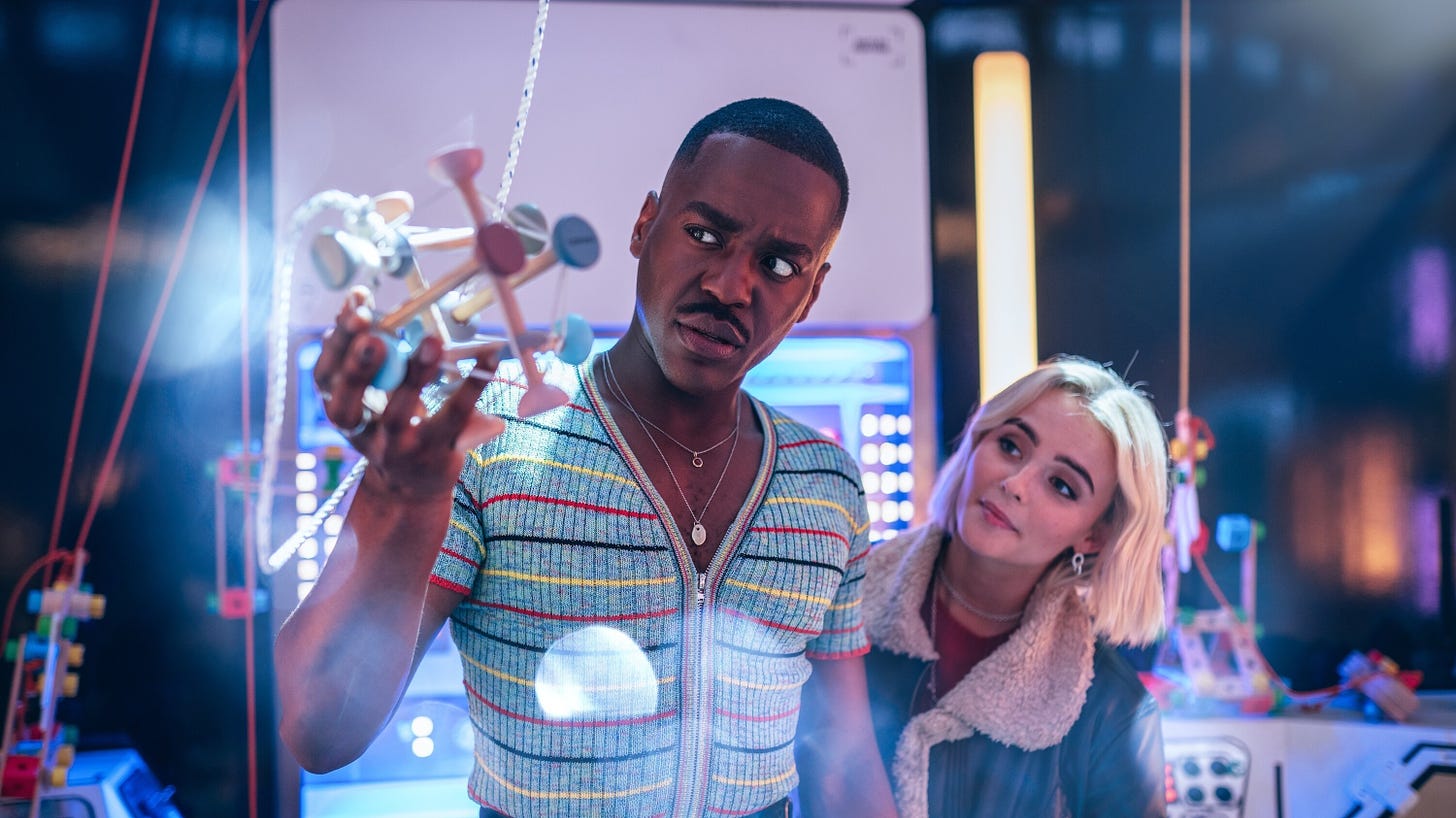
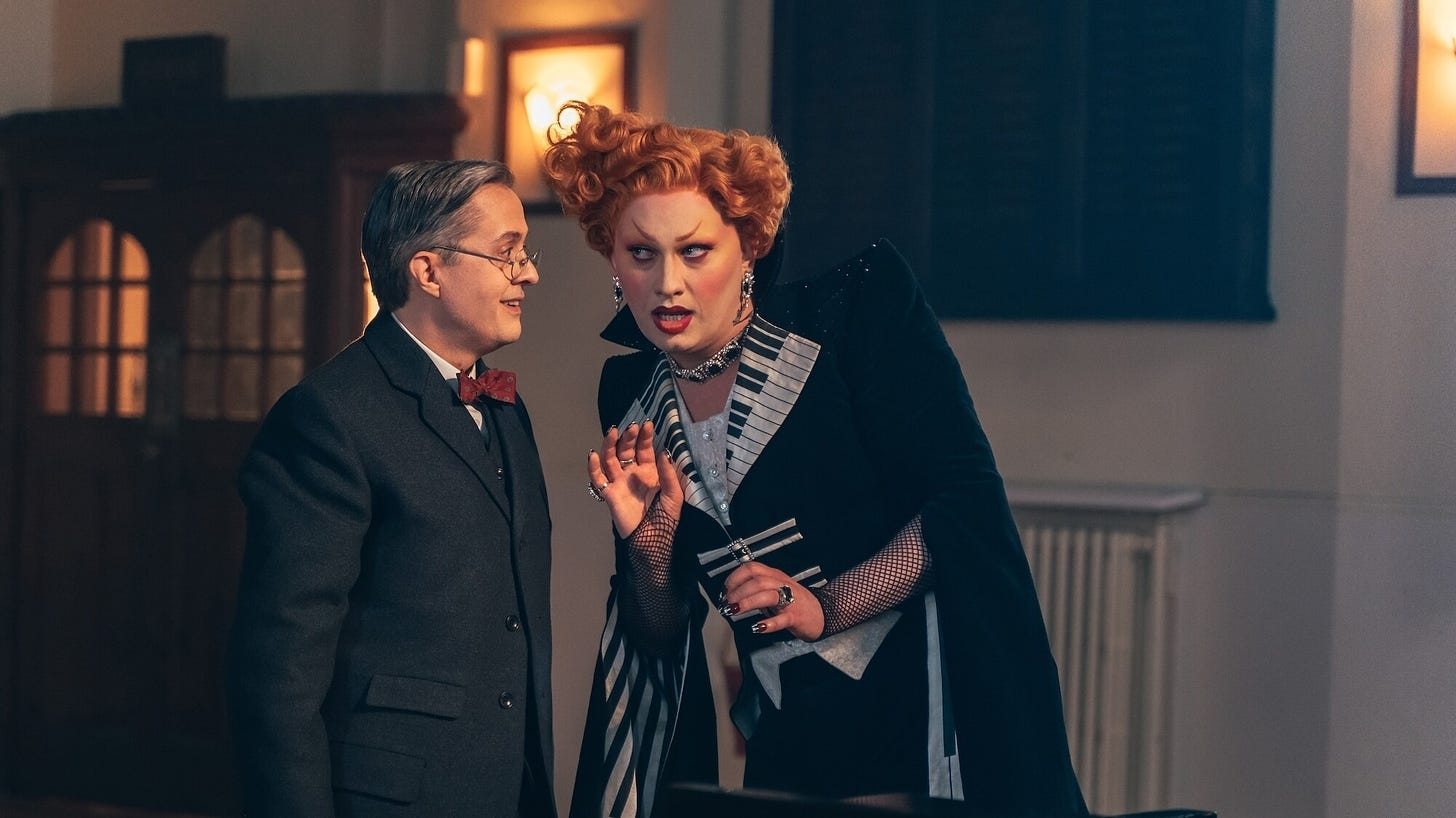
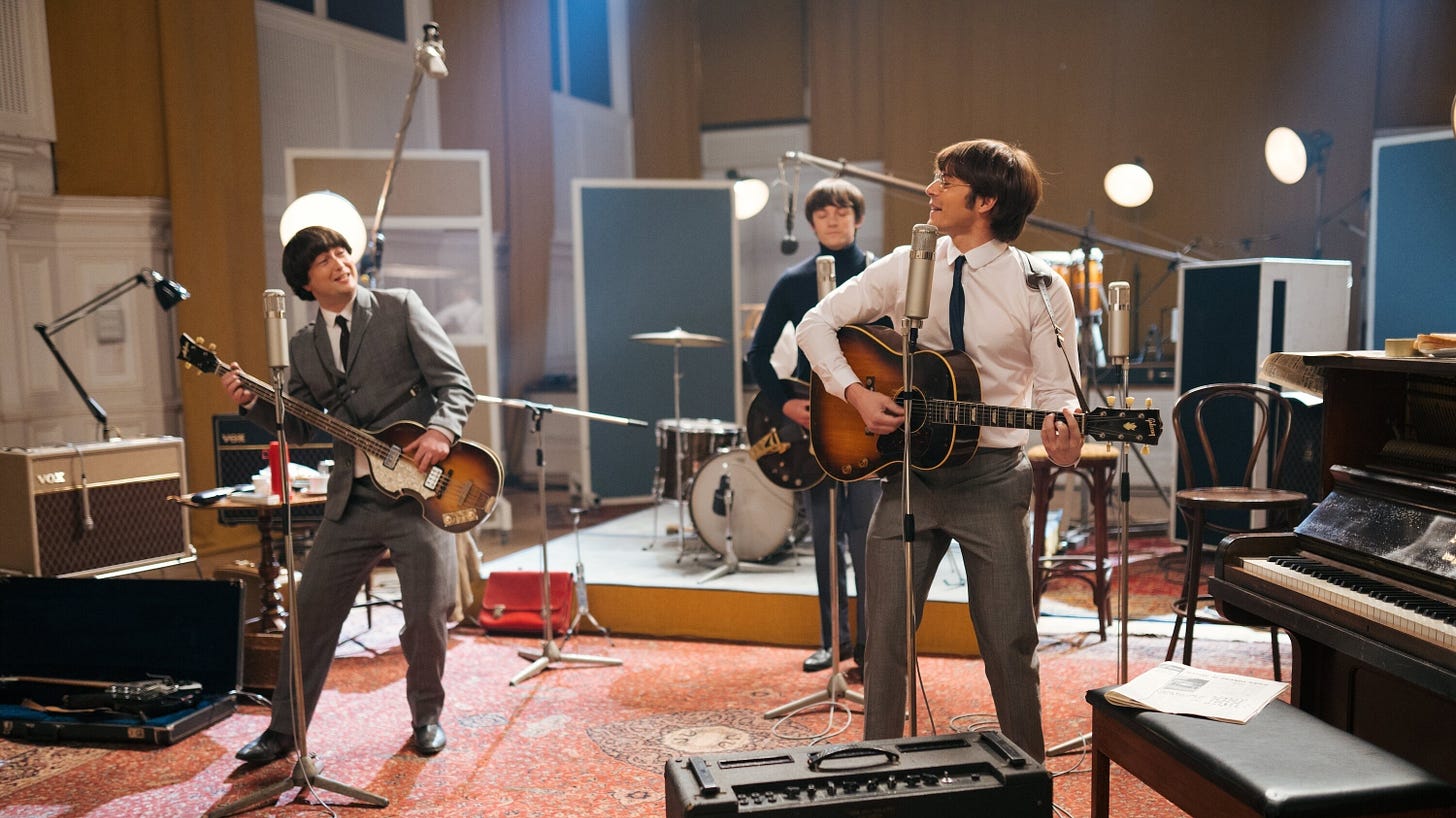
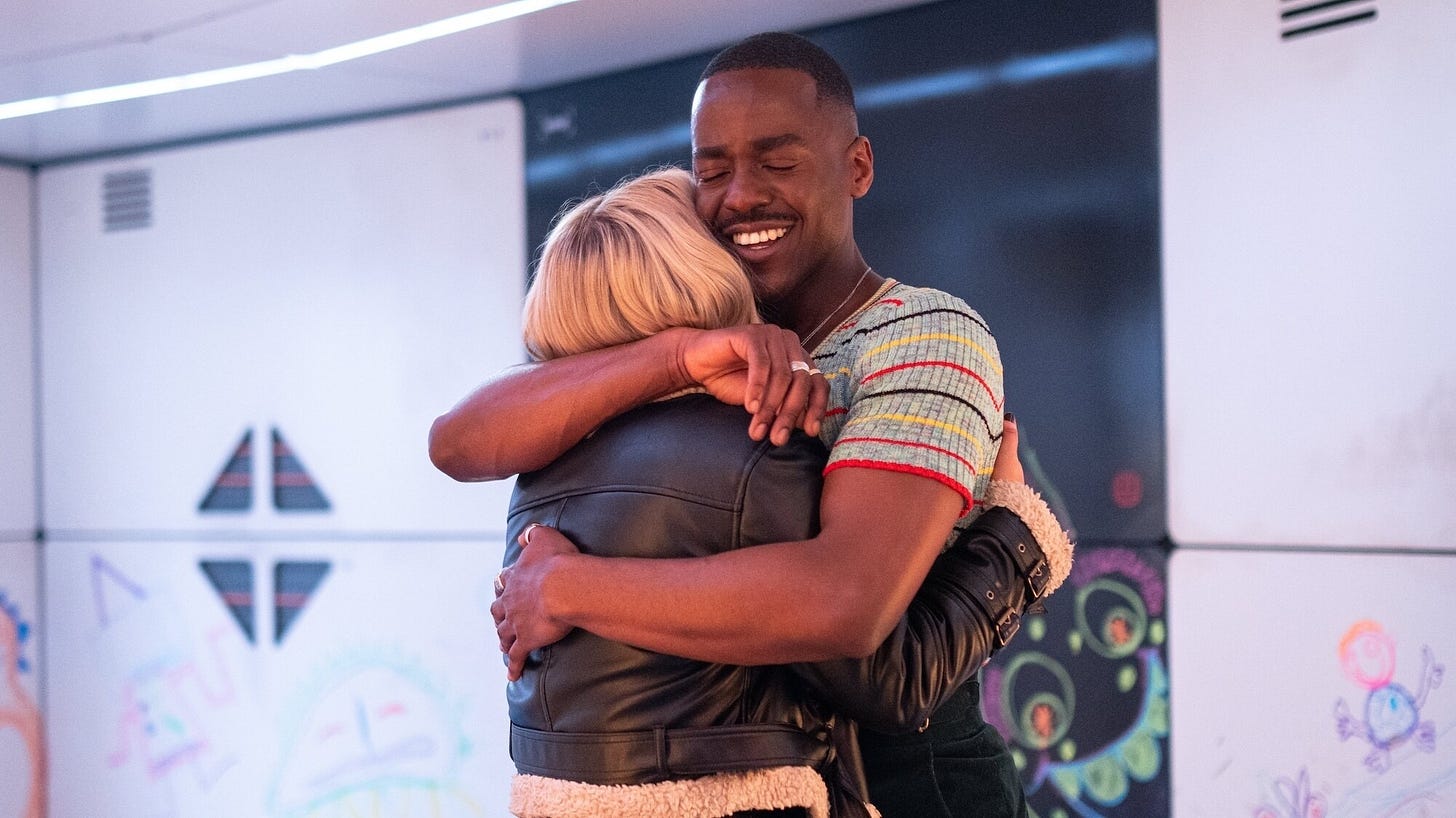
Ok, first off it's season 40.
Second off I felt like David Tennant was the Doctor from the moment he said "Did you miss me?" Eccleston's season was strong but I don't think he took to the role quite so quickly or so naturally.
Caroline, you and I had almost exactly opposite reactions to these two episodes. I thought "Space Babies" was terrific fun while "The Devil's Chrord" was a muddled mess. I can understand why the goofiness of "Space Babies" might be off putting to some - it's not the tone I want from Doctor Who all the time - but the babies were cute and the emotional stakes of brave babies looking for a loving home absolutely worked on me. Whereas "The Devil's Chord" felt like a concept instead of a story. God-like conceptual enemies can work when they are used sparingly, but I much prefer obstacles that are grounded in the real world even if they take a lot of sci-fi technobabble to overcome. The Maestro was pretty much just there to be an enemy that the Doctor couldn't defeat but somehow the Beatles could, by playing an unrecognizable series of notes*. I also think it was a big mistake to have two episodes in a row where the Doctor is explicitly afraid and calls out his own fear. Ncuti is a lot more appealing when he's allowed to be confident and brash.
* Seriously? Disney can afford to pay for a couple bars of "I Want to Hold Your Hand"?
Just watched this one BBC One visiting my mum at home. She's a big Beatles fan and cried when the Doctor saved the snot monster in the air lock. So these episodes went down remarkably well in my house